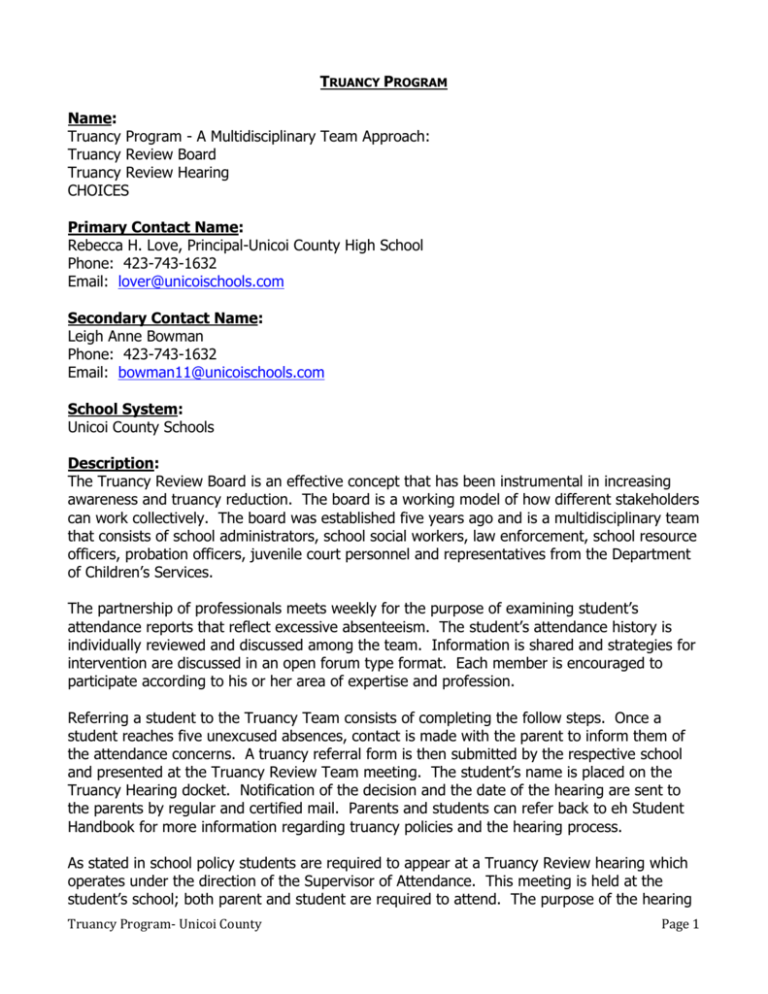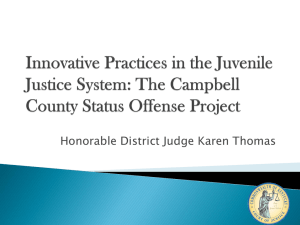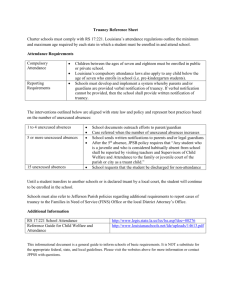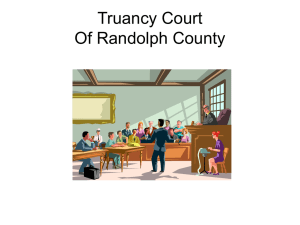Truancy Program - SPED
advertisement

TRUANCY PROGRAM Name: Truancy Program - A Multidisciplinary Team Approach: Truancy Review Board Truancy Review Hearing CHOICES Primary Contact Name: Rebecca H. Love, Principal-Unicoi County High School Phone: 423-743-1632 Email: lover@unicoischools.com Secondary Contact Name: Leigh Anne Bowman Phone: 423-743-1632 Email: bowman11@unicoischools.com School System: Unicoi County Schools Description: The Truancy Review Board is an effective concept that has been instrumental in increasing awareness and truancy reduction. The board is a working model of how different stakeholders can work collectively. The board was established five years ago and is a multidisciplinary team that consists of school administrators, school social workers, law enforcement, school resource officers, probation officers, juvenile court personnel and representatives from the Department of Children’s Services. The partnership of professionals meets weekly for the purpose of examining student’s attendance reports that reflect excessive absenteeism. The student’s attendance history is individually reviewed and discussed among the team. Information is shared and strategies for intervention are discussed in an open forum type format. Each member is encouraged to participate according to his or her area of expertise and profession. Referring a student to the Truancy Team consists of completing the follow steps. Once a student reaches five unexcused absences, contact is made with the parent to inform them of the attendance concerns. A truancy referral form is then submitted by the respective school and presented at the Truancy Review Team meeting. The student’s name is placed on the Truancy Hearing docket. Notification of the decision and the date of the hearing are sent to the parents by regular and certified mail. Parents and students can refer back to eh Student Handbook for more information regarding truancy policies and the hearing process. As stated in school policy students are required to appear at a Truancy Review hearing which operates under the direction of the Supervisor of Attendance. This meeting is held at the student’s school; both parent and student are required to attend. The purpose of the hearing Truancy Program- Unicoi County Page 1 is to formally notify the parent of the absenteeism, to put the student on informal notice that the truancy has become a serious concern, to identify the factors that contribute to the absences, and to develop a plan to address the issue using various strategies. A recommendation is made which can include, but is not limited to the following: A review hearing, increased attendance monitoring, referral to the truancy officer for a juvenile court petition, and/or a referral for services. Unless extenuating circumstances exist, a referral is made to a truancy intervention and prevention program called CHOICES. Students in grades 5-12 are required to attend CHOICES which is a 2 ½ hour comprehensive program that focuses on educating the parent and student on the consequences of truancy. The presence of a parent or guardian is mandatory for all students. Students in K-4 are not encouraged to attend due to content material. The program is offered without charge as a demonstration of the commitment level of the school to its community. Although CHOICES is new to Unicoi County, the statistics are indicative of success. 66% of students that completed the class have not had one unexcused absence since attending. 16.5% had one unexcused absence, and the final 16.5% had numerous unexcused absences. CHOICES is research-based and examines truancy forma a number of perspectives. The correlation between crime and truancy is demonstrated by the use of numerous statistics. The laws of compulsory school attendance are discussed and the responsibilities of the student and parent are examined in detail Information is provided from the Department of Safety and students are advised about attendance and academic requirements that need to be met in order to be eligible to receive or retain their permits/and or driver’s licenses. Charts are used to visually demonstrate the difference education can make in a person’s paycheck. A household budget sheet is used during an open class discussion to reinforce the need for an adequate salary. The juvenile justice system is explained in addition to probation and its restrictions. Parents are informed that they could be criminally charges and also incarcerated (which has occurred in Unicoi County although be it infrequently). Numerous handouts are provided to both student and parent which include a copy of the power presentation, statistics to reinforce the material and a letter written by the local Assistant District Attorney showing his strong belief in the value of education and a commitment to enforce the law. A survey is provided to both student and parent to allow them an opportunity to comment on the material, the presentation, and the speaker. Parents are encouraged to decide for themselves what price they are willing to pay for their child’s truant behavior. Students are challenged to decide for themselves what price they are willing to pay to be truant. Personal accountability and responsible decision making is a major component of the program. Another component of the truancy reduction program in Unicoi County High School is the reporting of driver’s license eligibility. Students who have fifteen unexcused days in one semester or students that have failed four out of six subjects become ineligible according to the State of Tennessee. The names of students who are non-compliant are reported to the Department of Safety whose privileges are revoked until compliance is met. This component was implemented in 2007/2008. In the first semester of 2007/2008, nineteen students were Truancy Program- Unicoi County Page 2 reported as out of compliance. In the second semester of 2007/2008, twenty six students were reported. In January of 2008, sixteen students were reported to the Department of Safety; however, the majority was not attendance related. The Truancy Review Board has been fully operational for five years. Within a year, the director of schools recognized the need for a truancy education program. In 2004, an agreement was entered into with an outside agency. However, in the 2007/2008 school year, the program was reevaluated and discontinued. In June of 2008, the high school social worker was contracted to present a program model which was approved for implementation n the 2008/2009 school year. The guiding principle behind the program is most students and parents are unaware of the consequences of truancy. The goal of the program is to inform and educate both student and parent so they can make an informed decision regarding school attendance. Without exception, the parent and student surveys (completed by the same at the end of the program) revealed a new determination by the students to attend school to avoid the consequences of truancy and a strong commitment expressed by parents to enforce attendance for the same reason. Components Added Since 2009: The first component is an informal adjustment which operates under the jurisdiction of the juvenile court. The program is a cooperative effort between the court system, the school, a local community service agency and the student and parent. The Youth Service Officer (YSO) and a school representative meet with the student and parent at the local courthouse when the unexcused absences have reached seven to eight days. The parent and student are given an opportunity to participate in the program, which is voluntary at this point. The parent and the student are expected to attend and fully participate in an intensive twelve-week parenting class which meets once a week for three hours at a time. The class is offered free of charge to the family and the agency is able to provide this service through grants. In exchange for their participation, the family is not charged a fine or any court costs. However, if the family fails to complete the agreement, the case is then referred to juvenile court. Since the informal adjustment component was added in January of 2009, sixty-two families have agreed to participate. According to the agency, only two families have failed to complete the class to date. The second component added is written notification is sent to the student’s home when the unexcused absences reach three days. This practice has been beneficial to both the parents and the school by increasing and improving communication between the stakeholders. On a number of occasions the letter has alerted the parent of their child’s absences of which they were unaware. The practice of early intervention has proved itself to be worth the effort. Subject Areas: Truancy. Intervention and Prevention School Attendance Truancy Educations Driver’ License Eligibility and Revocation Truancy Program- Unicoi County Page 3 Grade Level: All students Group(s) of Students: All, Free, IEP, LEP, Advanced. Groups of adults targeted for this practice: Administration, Professional Support Staff, Secretaries, Security, Parents, and Community Members. Length of Time: 1-3; 4-6 Years The Truancy Review Board and Truancy Review Hearing have been in operation since 2004. Since 2007/2008, student information has been reported to the Department of Safety at the end of each semester to determine drivers’ license eligibility. CHOICES was approved and included for use in the 2008/2009 school year. Resources: The foundation of the Unicoi County Truancy Board consists of the Director of Schools, Supervisor of Attendance, Administrative Secretary, High School Vice-Principal, High School Social Worker, Middle School Principal and Guidance Counselor, Elementary School Principals, Elementary School Social Worker, two Probation Officers, Juvenile Court Officer and law enforcement personnel. The success of the team is directly related to the commitment level of its members. The Team meets for 45 minutes each week; the Truancy Hearings require a minimum of 20 minutes per parent/student meeting. Truancy hearings consist of the Supervisor of Attendance, a school administrator and/or social worker, student and at least one parent or guardian. A probation officer, a school nurse and a school resource officer may attend the hearing to assist with the factors that contribute to the absenteeism. Court petitions and court hearings require the presence of the attendance supervisor and/or the deputy who filed the petition. Documentation of attempts made by the school system to address the truancy issue should be provided to the court along with a current student attendance report for the Judge to review. Accurate documentation is essential for tracking purposes and any follow-up referral services. This task requires a significant amount of time; however, responsibilities can be shared. Forms that are needed are truancy referral forms, parent/student conference forms, truancy hearing forms, release of information forms and juvenile court petitions. A spreadsheet is used to document referral information and results of truancy hearings. A notification letter is used to inform parents of the truancy hearing date, time and location. For letters are also sent to parents with information on the CHOICES class meeting. The CHOICES program requires that a person be familiar with the material, the PowerPoint presentation and its handouts. Handouts include a copy of the PowerPoint, financial statistics of persons with varying levels of education, a household budget sheet and a copy of a letter written by the local Assistant District Attorney. Surveys to both student and portent are provided for evaluation purposes. Truancy Program- Unicoi County Page 4 Supporting Research: According to Eileen M. Garry, “chronic absenteeism is the most powerful predictor of delinquent behavior (Truancy: First Step to a Lifetime of Problems, Office of Juvenile Justice and Delinquency Prevention. Retrieved 04-20-08). The vision of Unicoi County School System is a strong commitment to educating and shaping students to become responsible and productive citizens. Truancy intervention and prevention has to be a priority to make this a reality. The Unicoi County Truancy Review Board and the Truancy Hearings are changing lives without our student population. Every student, who at some point in their education exhibited truant behavior, that walks across the stage with their diplomas has the evidence in hand that truancy intervention is worth all the effort. Conclusion: Recent additions to the program include the scheduling of guest speakers that have expertise in some capacity’s regarding truancy. Upcoming changes to the CHOICEs program include the addition of videotaped messages from the Director of Schools, Principal(s), the School Resource Officer, the Sheriff, the juvenile court YSO, the Juvenile Judge and the Assistant District Attorney. It is believed that the videos will provide a strong message of solidarity among the stakeholders of the value of education and a demonstration of their personal commitment level toward truancy reduction. CHOICES is currently being translated into a Spanish version of the program. Truancy Program- Unicoi County Page 5





